
Research by Wärtsilä Energy, the global technology company, has found that the pace of Europe’s transition away from coal has recently been accelerated by more than five years due to Covid-19’s impact.
The data, provided by the Wärtsilä Energy Transition Lab, suggests that inflexible baseload coal will become a thing of the past faster than previously thought.
Coal generation in Europe was down by 30% in the first half of 2020, eliminating more than 55 million tonnes of carbon emissions, which equals the suspension of all transport, including aviation, across the continent for six months.
Energy demand in Europe dropped by 6.5% year on year as a result of Covid-19’s impact and the national lockdowns imposed as a result.
Wärtsilä Energy director of growth and development Ville Rimali said: “Coal has been on the decline for many years and Covid-19 has been the final nail in the coffin. We know that coal generation is not compatible with the low carbon, flexible energy system of the future, so we must pivot away from dirty generation and focus on renewables, storage, and flexibility to accelerate the transition to a 100% renewable future.”
Recent low power prices, caused by surplus of renewable generation, have led to coal being priced-out. Key markets, such as Germany, the UK, and Spain have seen a decrease of approximately 40% in day ahead power prices for the year to date.

US Tariffs are shifting - will you react or anticipate?
Don’t let policy changes catch you off guard. Stay proactive with real-time data and expert analysis.
By GlobalDataIn addition, on 5 July, a new record was achieved when 55% of the energy generation across the continent was supplied by renewable sources.
Despite that, some countries, such as Germany, were forced to keep baseload coal on, due to the inability for it to be turned off and on quickly on certain days, which brought excess supply to the power system.
The share of renewables in Europe has reached levels not previously expected for another decade, showing what is possible with the current energy systems. This offers a significant opportunity to learn how to accelerate the transition to 100% renewable energy.



